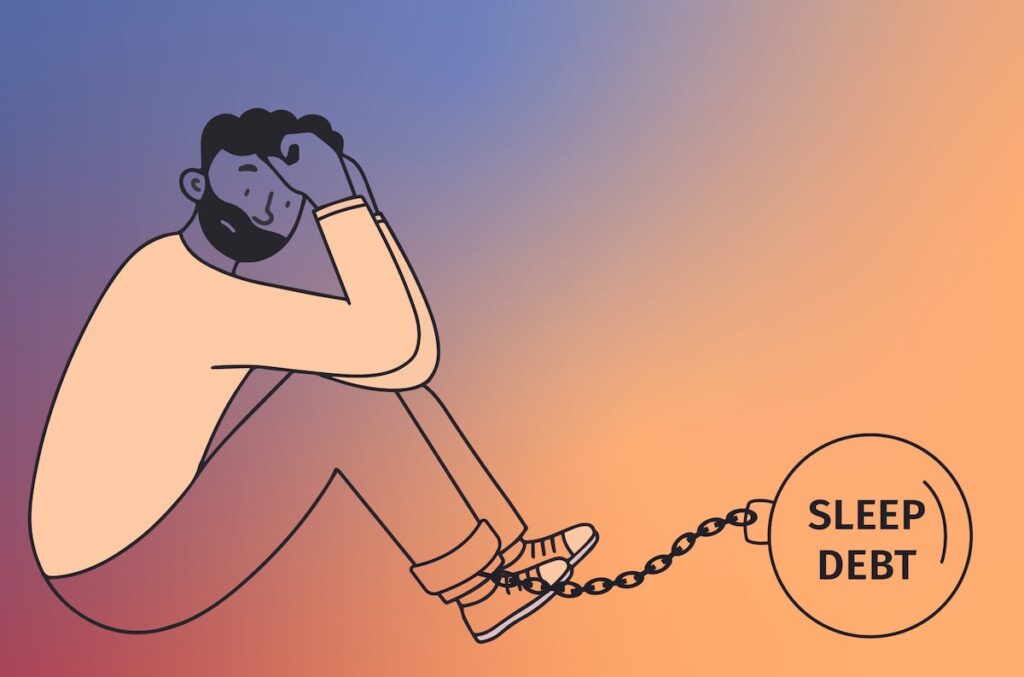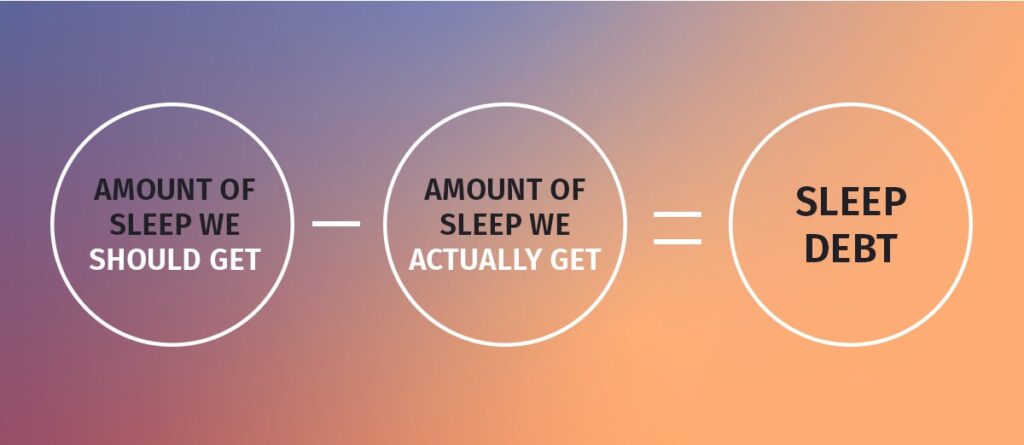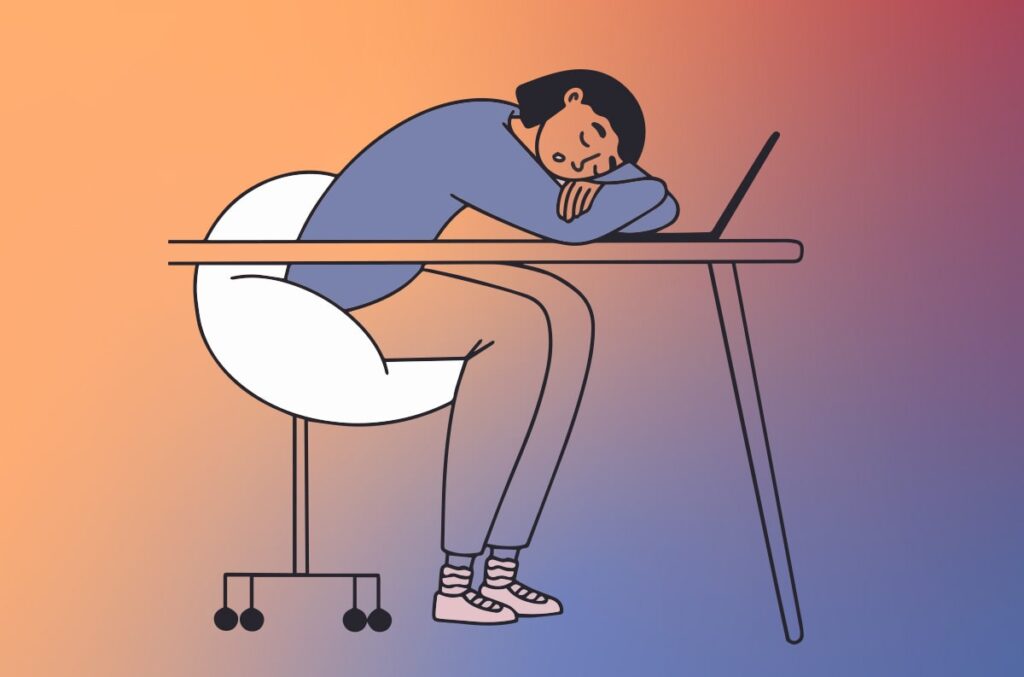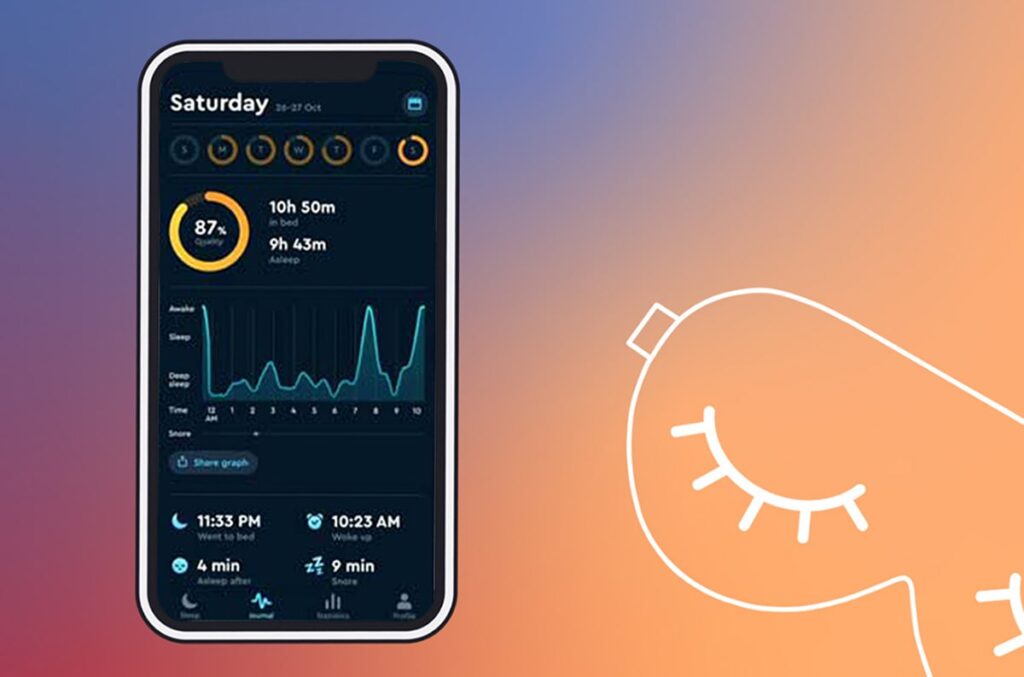
We’ve all had to deal with waking up after an awful night’s sleep with a long day ahead. Oftentimes, our busy days don’t allot time for us to nap or go to bed earlier than usual to make up for the night before.
One might think “I’ll just catch up on sleep over the weekend.” But is there such a thing as repaying sleep debt? Keep reading to find out more about sleep debt, what it does to your body, and if it’s truly possible to recover from it.
What is Sleep Debt?
Sleep debt is the amount of sleep you’ve lost compared to the amount of sleep your body needs to feel fully rested. This debt can accumulate over a day or several nights. Losing several hours of sleep per night for several days in a row could have consequences for your health or your daily performance.
Unfortunately, sleep debt is all too common among adults who typically need seven to nine hours of sleep per night to feel fully rested. According to a CDC study conducted in 2020, about one out of every three American adults slept fewer hours than the recommended hours per night.
How to Calculate Sleep Debt
If you’re curious on how much sleep debt you’ve racked up, we’re here to help you figure it out.

The first step to calculating your sleep debt is identifying the ideal hours of sleep your body needs.
For example, some people need the average eight hours of sleep to feel rested. Others may need 10 hours of sleep to feel ready to wake up. Once you determine the number of hours of sleep that works best for you, calculate the hours of sleep you’ve lost in a full week.
To do this, go through a full week and jot down how many hours you slept each night. Add the total number of hours you slept for the week. Then, take the number of hours you should have slept for the week. Subtract the total hours you slept from the total you should have slept. The final number is your sleep debt.
What Sleep Debt Does To You

Sleep is vital to our bodies because it’s when our brain, muscles, organs, and immune system rest and repair itselves. Even by missing one night of sleep, you may experience some negative effects on your mental and physical performance.
Following a short-term lack of sleep, you may experience poor cognitive function, increased irritability, and mood changes. Feeling sleepy throughout the day tends to make it difficult to concentrate on daily activities. Memory consolidation is a key mental process that occurs in the deep sleep stage. A lack of deep sleep caused by getting fewer hours of sleep per night may be linked to poor memory and difficulty learning new things.
Chronic sleep debt may have its risks and lead to potential negative long-term health effects. Some studies have shown there may be an increased chance of a heart disease with lack of sleep.
Other health risks associated with chronic sleep debt may include an increased risk of stroke, obesity, and depression. Poor sleep may also contribute to worsening the severity of existing chronic health conditions (such as high blood pressure, diabetes, and gastrointestinal symptoms).
The link between some health conditions and a lack of sleep may be an increased amount of the stress hormone cortisol. High cortisol levels can potentially suppress your immune system’s ability to fight inflammation. From impairment in judgment to a suppressed immune system, skipping sleep is difficult on your body.
Sleep Debt Symptoms
Your body will usually let you know that you need more sleep. Lauri Leadley, Founder & President, and Clinical Sleep Educator at Valley Sleep Center, walked us through the sleep debt symptoms to look out for:
Potential Behavioral Problems Often Caused by Sleep Debt
- Irritability
- Poor judgment
- Attention deficit
- Drowsy driving
- Memory issues
- Emotional stress
- Daytime sleepiness
- Poor risk management
- Depression
- Workplace accidents
Potential Physical Problems Often Caused by Sleep Debt
- Immune system dysfunction
- Vision problems
- Stress
- Advanced aging
- Reduced motor dexterity
- Weight gain/obesity
- Systemic inflammation, which can potentially lead to cardiovascular issues, diabetes, and stroke
How to Avoid Sleep Debt
An important way to prevent accruing sleep debt is to get enough sleep every night. This is often easier said than done, but practicing healthy sleep habits can help. By creating a relaxing environment and avoiding things that keep you awake, you can set your body up for successfully falling asleep.
The first tip to avoid sleep debt is to create a night routine to prepare you for bed. This usually means figuring out what time you will need to go to bed to get a full night of sleep. Leading up to your bedtime, perform some relaxing tasks to soothe your mind and body for sleep. This could be changing into comfortable pajamas, taking a hot shower, or playing some calming music.
Creating the right sleep environment can make a big difference in how easy it is for you to fall and stay asleep. Ideally, you should be sleeping in a dark, quiet room on a comfortable mattress. Limit your exposure to outside noise, artificial light from smartphones or TVs, and caffeine before bed to prevent interfering with your circadian rhythm.
Taking a short nap in the middle of the day around your work schedule can boost your energy level and for some, help offset lost sleep. However, one study showed that napping and catching up on sleep on the weekends alone may not be enough to resolve chronic sleep debt on its own. Regular exercise may also be linked to an increase in regenerative deep wave sleep, making it easier to fall asleep at night.
If you’re having trouble getting rest at night and want to avoid sleep debt, check out these resources on what to do when you can’t sleep.
Can You Recover from Sleep Debt?
The million dollar question that everyone wants to know the answer to: is it possible to make up for the hours of sleep you’ve lost? The answer is based on a few different factors, like how long you’ve had sleep debt.

Dr. Wu, MD, Medical Reviewer at Rise Science, says, “There’s longstanding evidence you can get out of short-term sleep debt — the kind you accrue from the occasional late night, travel jet lag, or poor week of sleep. You can make up for this kind of lost sleep by going to bed earlier, sleeping in a bit later, taking well-timed naps, and improving your sleep efficiency (how much time you spend in bed actually asleep) over one or several days (how long it takes depends how much acute sleep debt you have).”
Most of us will use our weekends to catch up on lost sleep. Although the idea of fixing your sleep schedule in general is great for your health, your body may need more time to fully recover.
“Weekend sleep ‘catch up’ is, unfortunately, unrealistic,” Leadley says, “The idea of a ‘sleep bank’ where you can deposit and pull from is misleading. You cannot store sleep for later, and you cannot go without adequate sleep for days and expect not to build sleep debt. Each night you miss out on quality sleep, you are adding to your debt.”
In short, fully catching up on sleep debt in two days is not likely. Fixing your sleep can be a daunting task, and you might want some help. Learn more about the RISE app and how it can tackle sleep debt with you in our complete review.
Sleep Deprivation vs Sleep Debt
The phrase “sleep deprived” is commonly used when talking about not getting enough sleep, but what’s the difference between sleep deprivation and sleep debt?
Sleep Deprivation
Sleep deprivation is a condition that results from regularly not getting enough sleep. The CDC recommends adults get at least seven hours of sleep per night to be well-rested. This amount may vary if you are pregnant, recovering from an illness, or experiencing jet lag.
People experience sleep deprivation by sleeping less than the recommended amount for their age. The most common symptoms of sleep deprivation are excessive daytime sleepiness, low energy level and trouble concentrating. Sleep deprivation can be short- or long-term based on how long you are receiving less than seven to nine hours of sleep per night.
How is Sleep Deprivation Different from Sleep Debt?
Sleep debt and sleep deprivation are both related to a lack of sleep, but these terms mean different things.
Sleep debt is the difference between the amount of sleep you should be getting, and the amount that you actually get. Sleep deprivation is the state of feeling fatigued after not getting enough sleep. Basically, sleep deprivation is the result of sleep debt.
Final Thoughts
Sleep debt and sleep deprivation are two sleep-related concerns that can majorly impact your overall health. Be mindful of any sleep debt symptoms you’re experiencing so you can begin implementing healthier sleep habits.
Getting enough sleep every night is a sufficient way to prevent sleep debt and can assist you to perform at your best. Although daytime naps and sleeping in on the weekends is a common approach, remember that focusing on getting enough sleep every night is a better way to recover from sleep debt.
People who get enough sleep tend to recover from distractions faster and make fewer mistakes at work and avoid becoming sleep deprived. So pay attention to how much rest you are getting, and try to prioritize sleep.
FAQs
Is sleep debt actually a thing?
Yes, sleep debt is the loss of sleep you get each day in comparison to the amount of sleep you should be getting for a full night’s rest.
Can you avoid sleep debt?
Yes, you can avoid sleep debt by taking action. Make conscious efforts to improve your sleep hygiene, and follow our tips for bettering your sleep hygiene to get started!
How do I get rid of my sleep debt?
Getting rid of sleep debt is all about routine. If you need help getting started, check out our article on ways you can fix your schedule!
What is the difference between sleep deprivation and sleep debt?
Sleep deprivation is any time you lose sleep, regardless of how many hours you’ve lost. Sleep debt is the total amount of hours of sleep you’ve lost. Sleep debt is the end result of sleep deprivation.
